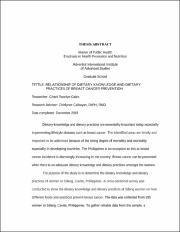| dc.description.abstract | Dietary knowledge and dietary practices are essentially important today especially in preventing lifestyle diseases such as breast cancer. The identified areas are timely and important to be addressed because of the rising degree of mortality and morbidity especially in developing countries. The Philippines is no exception to this as breast cancer incidence is alarmingly increasing in the country. Breast cancer can be prevented when there is an adequate dietary knowledge and dietary practices amongst the women. The purpose of the study is to determine the dietary knowledge and dietary practices of women in Silang, Cavite, Philippines. A cross-sectional survey was conducted to show the dietary knowledge and dietary practices of Silang women on how different foods and practices prevent breast cancer. The data was collected from 285 women in Silang, Cavite, Philippines. To gather reliable data from the sample, a
sampling error formula was used. The findings of the study showed that 80 (28.1%) of respondents have poor dietary knowledge, 178 (62.5%) have average dietary knowledge, and only 27 (9.5%) of women were found to have good dietary knowledge of breast cancer prevention. The findings also showed that 41.8% of the respondents have poor level dietary practices in terms of frequency of food consumption, and 65.3% have poor dietary practices in terms of number of servings. More than half (54.4%) of the respondents have poor level of overall dietary practices. Moreover, this study showed that there was a significant difference between dietary knowledge and practices of breast cancer prevention in these following moderator variables: age, specifically on knowledge (p = .039), frequency of food consumption (p = .000), number of servings (p = .000), and overall dietary practices (p = .000); age of menses, specifically on number of servings (p = .011), marital status specifically on frequency of food consumption (p = .001), number of servings (p = .005), and overall dietary practices (p = .001); and family income specifically on knowledge (p = .001). There was also a significant difference between dietary knowledge and dieatary practices specifically in terms of dietary practices in frequency of food consumption, servings sizes and overall practices for the four age groups (p < .01, p < .01, and p < .01, respectively). This study showed that that there is a very weak relationship between dietary knowledge and overall dietary practices (r= .165, p = .01) The predictive model of dietary knowledge and dietary practices of breast cancer prevention include age (β = .375, p = .001) and dietary knowledge (β = .283, p = .007). | en_US |

